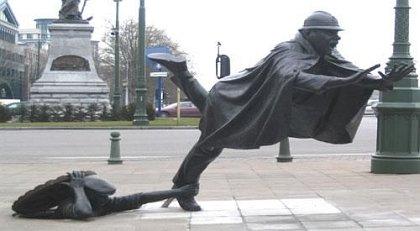
Blunders?!
Regardless of strength, some players make serious blunders more often than others. While obviously most mistakes in chess are due to either a miscalculation or misevaluation of the position, when a 2500-rated player simply puts a piece en prise, you have to look for an explanation in the realm of psychology. Perhaps nerves or other mental health issues. Other players in the same class are better competitors and rarely make simple blunders. Unfortunately I definitely fall into the first category - my brain frequently short-circuits, and it seems this problem has gotten worse in the last couple of years.
I recently played in the Liberty Bell Open, and on the same day I blundered two pieces in two different games. The first game was nevertheless quite interesting, so I decided to comment it.
Before this game, I had 2.5/3 and was in good shape in the tournament. The game against FM Van Kooten (2365 Fide) began like this:
My last two moves, 9.f5 and 10.fxe6 only make sense coupled with the following "combination". Otherwise, it was better to play in a slower way with something like 9.Qe2 or 9.Be3. I had calculated what now happened when I played 9.f5, but suffered from a serious hallucination which is hard to explain.
At this point I made the insane move 11.Ne5??. After 11...fxe5 12.Qh5+, I was aware of three legal moves- 12...g6, 12...Kd8, and 12...Ke7. 12...g6 is of course met by 13.Qxe5, winning the rook. 12...Kd8 obviously loses the bishop on f8. And 12...Ke7 is met by a pretty queen sacrifice - 13.Rf7+ Kd6 14.Qxe5+! Kxe5 15.Bf4+ Kd4 16.Ne2 mate.
Well, we haven't seen this kind of picture much since the nineteenth-century "X vs Amateur" games. But I was willing to believe that he had overlooked the queen sacrifice, and was hoping he would let me play it on the board rather than resigning. In fact, I was rather excited and couldn't force myself to recheck my calculations, and played 11.Ne5 pretty much instantly. It's too bad I didn't recheck, because it could have saved me some trouble. Although I am not sure even looking again would help, because I was obviously in a mental fog that day.
You probably already guessed what he played - 12...Kd7. After this I pretty much wanted to resign right away, but saw that there was at least a little hope, so I played on, with 13.Rf7+, and he sunk into thought...
I was pretty happy about saving the game after blundering a piece against a decent opponent. It was an obviously flawed but still exciting game, so I decided to comment it here. Of course, this was a warning that I was capable of any kind of strange hallucinations.
In the next round (on the same day), however, I made a blunder from which it was impossible to recover.
I reached this winning position, with over an hour on the clock. The black king is trapped by the passed g-pawn and the wonderful knight on e5, while the black pieces are too far away. Now 42.g6 was the simplest win. I saw this, and thought Black would have to anticipate the threat of 43.Rh2 and Rh7+ followed by Ng4-f6 by playing 42...Kg8. Then White can play 43.Rh2 anyway, and after 43...Rxa2 44.Rh7 Rg2 (forced since Ng4 is a threat) 45.Rxa7 and Black can resign - White will just play Rb7 and collect the b-pawn and then bring the king up.
It turns out that it is slightly more complicated, since after 42.g6 Black can play 42...b4, and White will have to find a way out of the checks - 43.Rh2 Kf6 (43...Rxa2 44.Rh7+ Kf6 45.d4 wins) 44.Rh7 Kxe5 45.g7 Nd1+ 46.Ke2! Rxa2+ 47.Kf3 Rf2+ 48.Kg3 Rf1 49.Kh2 Rf2+ 50.Kg1 and White wins. However, it would not be hard to find that since all of the moves are forced.
42.Kd4 is probably also good enough, but not the most simple.
However, after thinking for fifteen minutes I played 42.Rf2??, simply heading for the same position as 42.g6 in a different way. For example 42...Rxa2 43.Rf7+ Kg8 44.g6 Rg2 45.Rxa7, with the same position as above.
Naturally after 42...Nd1+ I resigned and quit the tournament as well.






